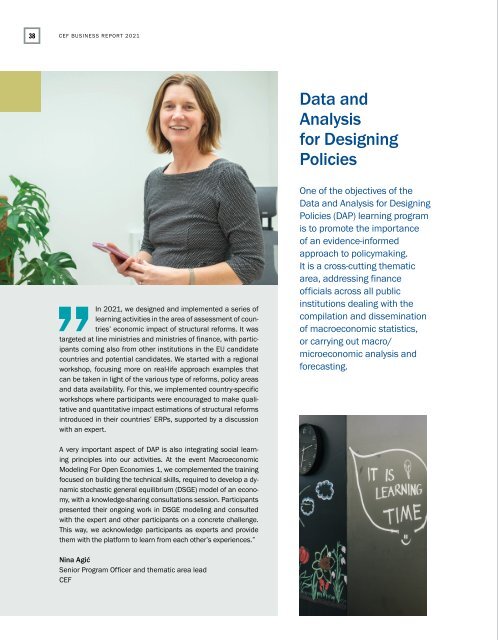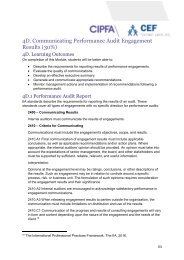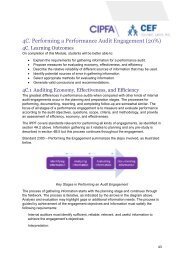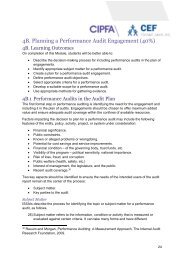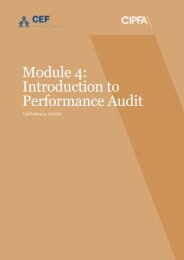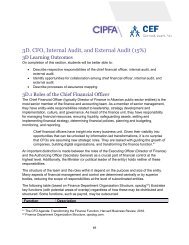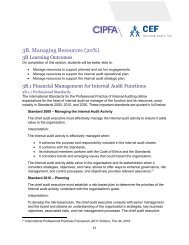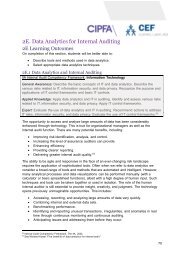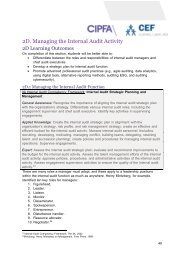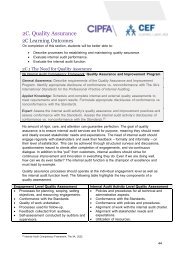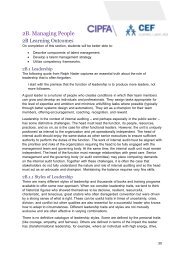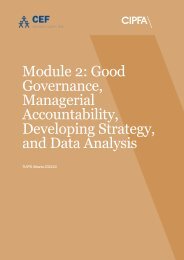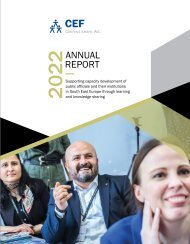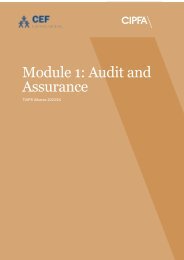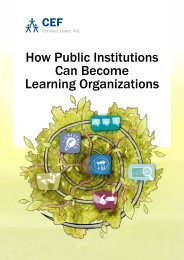CEF Annual report 2021
You also want an ePaper? Increase the reach of your titles
YUMPU automatically turns print PDFs into web optimized ePapers that Google loves.
38 <strong>CEF</strong> BUSINESS REPORT <strong>2021</strong><br />
LEARNING PROGRAM 39<br />
In <strong>2021</strong>, we designed and implemented a series of<br />
learning activities in the area of assessment of countries’<br />
economic impact of structural reforms. It was<br />
targeted at line ministries and ministries of finance, with participants<br />
coming also from other institutions in the EU candidate<br />
countries and potential candidates. We started with a regional<br />
workshop, focusing more on real-life approach examples that<br />
can be taken in light of the various type of reforms, policy areas<br />
and data availability. For this, we implemented country-specific<br />
workshops where participants were encouraged to make qualitative<br />
and quantitative impact estimations of structural reforms<br />
introduced in their countries’ ERPs, supported by a discussion<br />
with an expert.<br />
A very important aspect of DAP is also integrating social learning<br />
principles into our activities. At the event Macroeconomic<br />
Modeling For Open Economies 1, we complemented the training<br />
focused on building the technical skills, required to develop a dynamic<br />
stochastic general equilibrium (DSGE) model of an economy,<br />
with a knowledge-sharing consultations session. Participants<br />
presented their ongoing work in DSGE modeling and consulted<br />
with the expert and other participants on a concrete challenge.<br />
This way, we acknowledge participants as experts and provide<br />
them with the platform to learn from each other’s experiences.”<br />
Data and<br />
Analysis<br />
for Designing<br />
Policies<br />
One of the objectives of the<br />
Data and Analysis for Designing<br />
Policies (DAP) learning program<br />
is to promote the importance<br />
of an evidence-informed<br />
approach to policymaking.<br />
It is a cross-cutting thematic<br />
area, addressing finance<br />
officials across all public<br />
institutions dealing with the<br />
compilation and dissemination<br />
of macroeconomic statistics,<br />
or carrying out macro/<br />
microeconomic analysis and<br />
forecasting.<br />
EVENTS<br />
Macroeconomic Modeling for<br />
Open Economies 1<br />
Structural Reforms and<br />
Assessment of Their Economic<br />
Impact<br />
Beyond Fiscal Implications of<br />
Structural Reforms*<br />
Translation of Financial<br />
Statements into Statistics<br />
Economic Analysis and<br />
Forecasting with Micro-Data<br />
* Six events organized for Albania, Bosnia<br />
and Herzegovina, Kosovo, Montenegro and<br />
Serbia, North Macedonia and Turkey<br />
PROGRAM DONORS<br />
• Banka Slovenije<br />
• EU<br />
• Ministry of Finance, Slovenia<br />
OTHER PROGRAM<br />
PARTNERS<br />
• Banque de France<br />
• European Central Bank<br />
• Eurostat<br />
• IMF<br />
• Institute of Macroeconomic<br />
Analysis and Development,<br />
Slovenia<br />
• National Bank of Moldova<br />
Nina Agić<br />
Senior Program Officer and thematic area lead<br />
<strong>CEF</strong>


